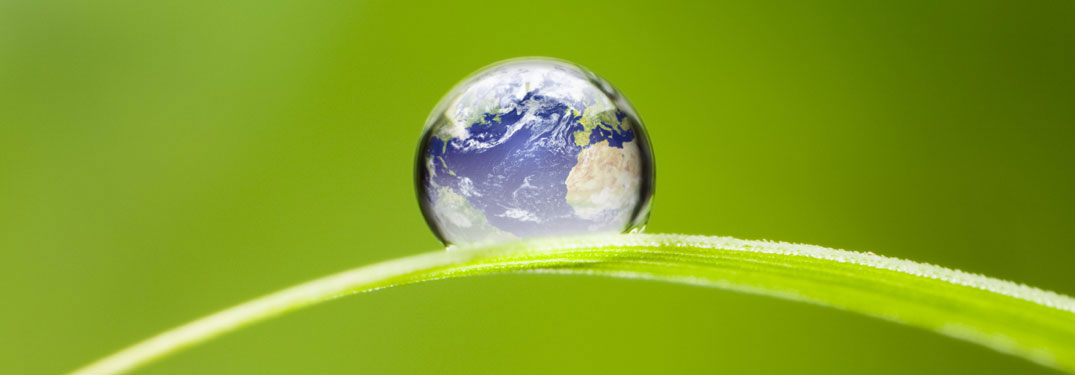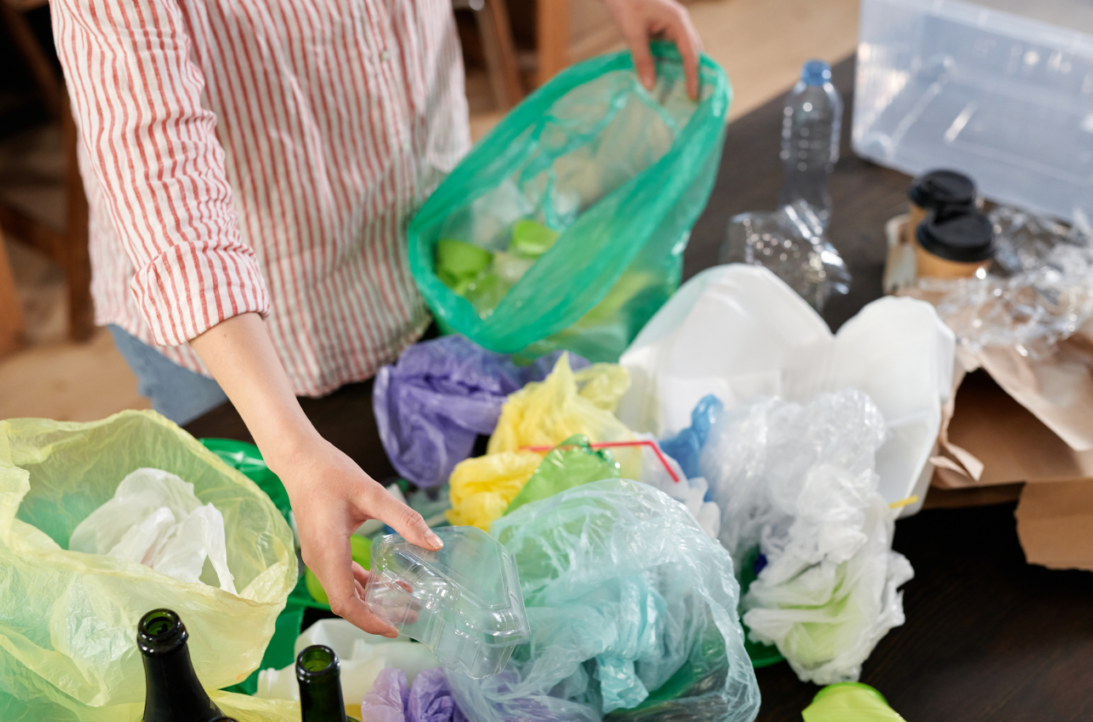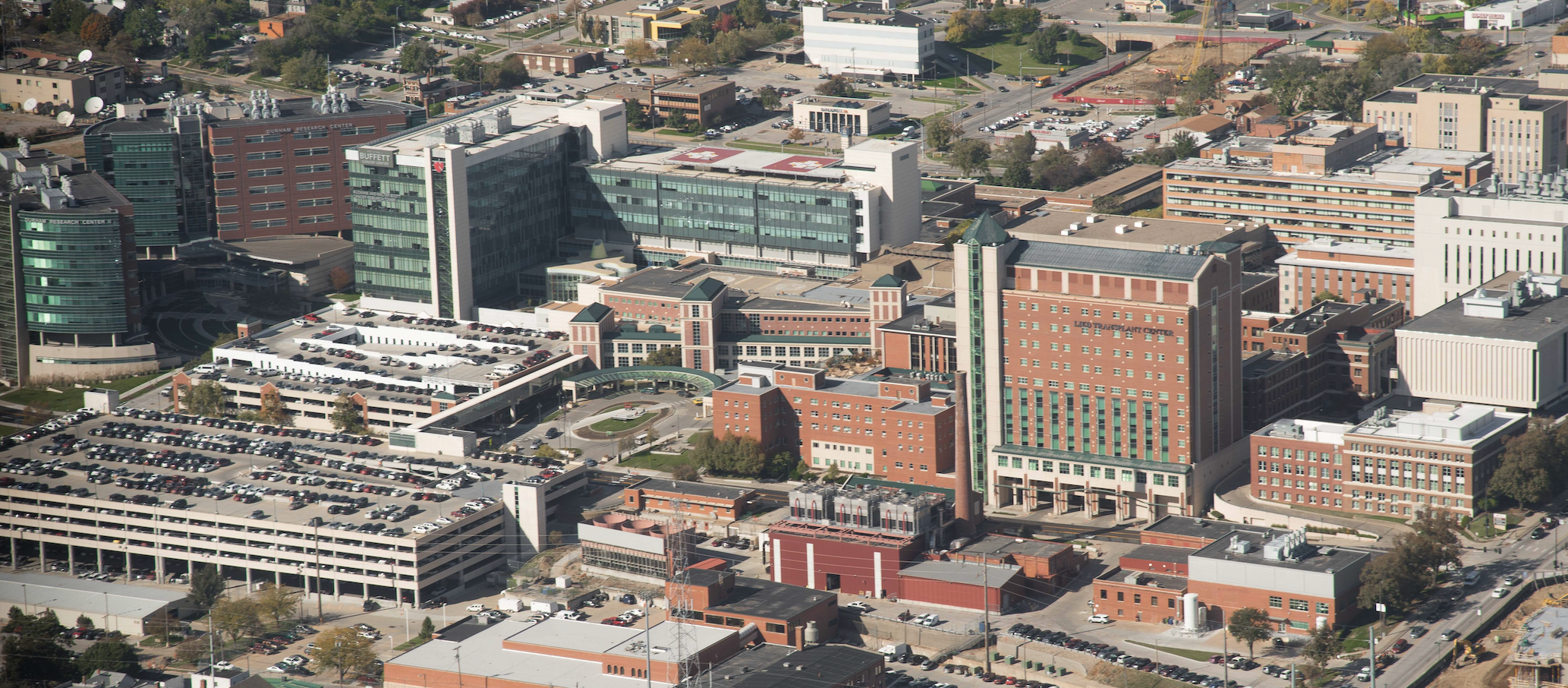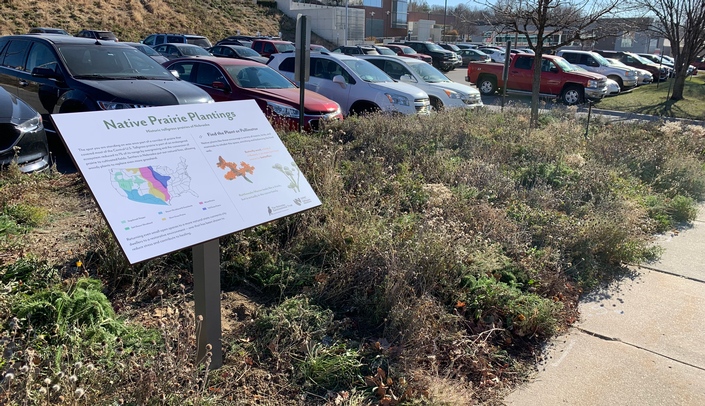UNMC student studies local heat islands

In February, the Healthy Earth Alliance (HEAL) hosted a presentation from Aziz Abdoulaye, a PhD student at UNMC, titled, “Building Community Resilience to Extreme Heat in Historical Redlined Areas of Omaha.” Aziz plans to study the distribution of urban heat islands in Omaha this summer.
Urban heat islands occur when developed areas are significantly warmer than surrounding rural areas, an effect that is expected to worsen with climate change. Buildings and roads, which are more abundant in cities, absorb and re-emit the sun’s heat more than vegetation. This heating effect is persistent at night, which is problematic for people, plants and animals who typically recover in cooler overnight temperatures.
Abdoulaye is using the framing of historically redlined areas in Omaha to examine the prevalence of urban heat islands. In 1925, the government-sponsored Home Owners Loan Corporation (HOLC) released risk assessment maps that ranked urban areas from lowest risk to greatest risk of mortgage security. Lenders often used these maps to deny loans to credit-worthy applicants, producing cascading negative effects for low-income and predominantly Black neighborhoods that often were designated as high risk. Redlining worsened segregation and income inequality, effects that still can be observed in Omaha today.
There is research to suggest that heat islands disproportionately impact historically redlined communities and that historically redlined areas may have fewer green spaces, more surface parking and other variables that increase the urban heat island effect.
This summer, Abdoulaye plans to recruit volunteers to drive and bicycle around Omaha with weather sensors to track temperature, humidity and wind on each volunteer’s route. The data will be aggregated to create heat index maps that help inform communities about local extreme weather. Abdoulaye hopes the project will lead to policy changes that include planting vegetation and opening cooling stations in strategic parts of the city.
In Nebraska, the annual number of days above 100 degrees Fahrenheit is expected to double in the next 70 years. Abdoulaye’s research will play an important role in strategically increasing resilience to the effects of climate change. Stay tuned for more information about Abdoulaye’s research project this summer and ways to get involved.
International day of women and girls in science

Did you know that women are typically given smaller research grants than their male
colleagues?
And, while they represent 33.3% of all researchers, only 12% of national science
academy members are women. That’s why, on February 11th, we celebrate International Day of
Women and Girls in Science – to acknowledge these gender gaps and recognize the importance
of closing them.
Over the past few decades, education and career opportunities for women have grown. But
when it comes to participating in science, women and girls continue to be excluded and
underrepresented. Allowing all people to participate fully in scientific fields is a key part of
sustainable development.
Women have played an important role in the history of science, dating back to the 1800’s when
Elizabeth Garrett Anderson became the first female physician. Since then, women have made
groundbreaking scientific discoveries, won Nobel Peace Prizes, taken on leadership positions in
scientific associations, and much more. For example, in 1951, Rosalind Franklin discovered
DNA’s helical structure. However, James Watson and Francis Clark are often attributed this
discovery, even though they couldn’t have done it without Rosalind’s data. This is just one of the
many examples where the leader in a discovery was female but men were given the majority of
the credit. Recognizing the role of women like Rosalind in scientific history helps younger
generations of women see themselves in the field and encourages them to pursue their
interests.
The United Nations Sustainable Development Goals include a goal focused on achieving
gender equality. Sustainable development requires that all people, especially women and girls,
are allowed to fully participate in society. Supporting and empowering women – not just in
science, but in any field – will result in greater opportunities for human advancement.
Check out this article for a few of the ways you can help support women’s advancement in
science! You can also read about the progress that the United Nations has made since 2016
within gender equality and the movement of empowering women and girls.
Environmental injustice hurts communities of color

Today is the first day of Black History Month, a month devoted to celebrating all of the contributions and achievements in U.S. history by Black Americans. It also is a time to recognize the inequality that still exists in the community.
The Princeton Student Climate Initiative defines environmental justice as “a social justice movement that seeks to dismantle the flawed environmental policies that have long harmed low-income communities and communities of color, and instead pursue policy and development that work to create a sustainable, cooperative and equitable future for the environment.”
The environmental injustice that exists for communities of color is one of many disadvantages caused by historical and current systemic racism. For example, toxic landfills and factories are frequently located within communities of color, and more than 1 million Black Americans live within a half-mile of a natural gas facility. Living in these areas increases the risk of cancer, asthma, heart disease, cognitive problems and other health problems due to poor air quality.
The effects of climate change, such as extreme weather events, disproportionately impact communities of color. A study done by Rice University showed that wealth inequality grew between white and minority residents in counties following significant damage from natural disasters.
Environmental injustice shows up in all kinds of ways. With World Wetlands Day being marked on Wednesday, here’s another example: The Wetlands Conservancy recognizes that those affected by wetland degradation often are those most marginalized in a community. The conservancy is striving to represent all communities to create common goals in protecting wetlands.
The NAACP and numerous other organizations are working to create sustainable investment that brings environmental justice and health to communities of color. The NAACP Environmental and Climate Justice Program works to reduce harmful emissions, advance energy efficiency and clean energy sources such as wind and solar, strengthen community resilience to natural disasters and create more livable neighborhoods. See more at the program’s website, including an introductory video.
Med center recycling questions answered

UNMC and Nebraska Medicine’s LiveGreen website answers many common recycling questions relating to the med center.
If you have a question about recycling at the med center, check out the LiveGreen recycling page. Resources also are available in the page on materials.
What can be recycled in the bins around campus?
Various types of recycling bins are available at the med center to helps keep metal, plastic, paper and cardboard from going to the landfill. Each bin has signage indicating what items are accepted. By policy, all paper should be placed in a blue deskside bin, large blue bin or large gray DataShield container. All paper is shredded to ensure HIPAA/FERPA/confidentiality compliance, and that applies even to non-confidential paper such as newspapers. Cardboard should be broken down and placed behind paper bins or in an area’s the designated location. Contact the Office of Sustainability for additional bins for an area.
What else does the med center recycle?
The med center recycles additional materials that include aerosol cans, alkaline batteries, furniture, electronics and writing instruments through processes outside of the normal recycling collection. Check out the recycling website for information about diverting other materials.
What are other ways to reduce waste?
● Supply exchange: Do you have unused supplies that could be used by somebody else? Are you in need of supplies? Check out the med center supply exchange to list and find office, lab and other supplies.
● Recycling special collection event: Each year, usually during Earth Month, the med center and University of Nebraska at Omaha partner to host a paper shredding, techno trash and e-waste recycling event.
● Waste handling information: UNMC is required to manage waste in a manner designed to protect patients, employees, students, contractors, visitors and volunteers, as well as the environment.
Why should be recycled?
Recycling is a simple way to help reduce the amount of material the med center sends to the landfill. Material in the landfill creates toxic emissions as it decomposes, while recycling turns old materials into new ones. Reducing and reusing are great strategies for helping the med center meet its Net Zero Waste by 2030 goal. Check out the online dashboard to track the progress.
For additional questions, please email the Office of Sustainability.
Staying energy efficient in the cold

As temperatures drop outside, people can take some easy steps to conserve energy inside.
- Open blinds and curtains during the day, but button down at night.
Letting the sun in allows the greenhouse effect to heat your home naturally. On the flip side, windows can be a source of heat loss too, so close blinds and curtains at night to add a layer of insulation to drafty windows.
- Find and fix air leaks and drafts
Drafty windows and doors can be a major source of heat loss. Fortunately, these leaks can be easily remedied with caulking and weatherstripping. If a fireplace is not in use, close the fireplace flue.
- Close off unused rooms.
To prevent wasting energy on unused spaces, close doors and vents in any rooms that are rarely used.
- Turn the temperature in your home down a few degrees, especially overnight while you sleep.
According to the U.S. Department of Energy, households can save as much as 10% a year on heating and cooling by turning their thermostats back 7° to 10°F for eight hours a day from normal settings.
- Invest in a qualified smart thermostat, and OPPD will credit your account.
An excellent way to ensure thermostats are set to optimal efficiency is by using a Wi-Fi enabled smart thermostat. The device will automatically adjust settings to maintain your programmed preferences.
- Add an extra layer and get cozy under blankets.
Balance lower thermostat settings by wearing layers and warm socks. Add additional blankets to beds and keep extra throw blankets on couches.
Sustainability council starts its sixth year

The med center is fortunate to have a wide variety of resources available as it strives to achieve its 2030 sustainability goals.
These resources include campus sustainability manager Jerrod Bley, a group of dedicated LiveGreen ambassadors and local grants and partners.
For the sixth year, the med center will continue to leverage the expertise of the Executive Sustainability Council, a group of some 15 leaders from throughout the system. The council exists to:
- Set sustainability-related vision and goals.
- Allocate the resources, both financial and in staff time, necessary to achieve campus sustainability goals.
- Strategize the effective communication of the importance and impact of sustainability within and outside of the organization.
- Determine and enact policy changes that lead toward the achievement of campus sustainability goals.
- Assist in brainstorming strategies, determining timing for implementation of resource-intensive strategies and coordinating working groups to implement resource-intensive strategies.
- Connect operationally focused sustainability efforts with academic and patient-focused activities of the organization.
- Be accountable for organizational progress toward established goals.
Council chair Jennifer Bartholomew, vice president and associate vice chancellor, facilities management, for UNMC and Nebraska Medicine, said, “Our mission to lead the world does not just apply to taking care of patients — it also applies to taking care of our community and the planet. We are proud of what we have accomplished, and as we look to grow and expand, it is essential we plan for a future of responsible resource use.”
The Executive Sustainability Council meets quarterly, and this past year it has initiated a variety of focus teams to address campus sustainability issues, including a composting focus team, pathway to net-zero energy focus team and a team to review the density sustainability metric.
By working with representatives throughout the system to address large, campus-wide sustainability related issues, the med center ensures that these decisions work for and reflect several areas of campus. A full list of council representatives is available online.
Sustainable New Year’s resolutions

Welcome to 2022. To mark the New Year and honor the tradition of New Year’s resolutions, here are a few resolutions with a sustainable twist.
Traditional resolution: Eat healthier
Public and planet health boost: Reduce or eliminate meat and dairy from your diet
With livestock contributing about 14.5% of the world’s greenhouse gases, a worthy goal is to reduce meat and dairy consumption incrementally, if not entirely. For example, choose two days per week to replace meat and dairy with protein-rich plants such as beans, legumes, nuts and grains. Likewise, know your meal’s origin story; ask your local butcher about the location and living conditions of the animal. Or better yet, purchase directly from local, ethically-minded and sustainable small farms.
Traditional resolution: Exercise more
Public and planet health boost: Establish or increase active-commuting habits
A simple but brilliant way to increase exercise and protect our planet is to change how we get to and from our daily activities. For example, walking or cycling to work allows for daily exercise without scheduled gym time. Opting for a brisk walk to a public transit stop provides exercise and contributes to a significant reduction in emissions.
Traditional resolution: Spend more time with family and friends
Public and planet health boost: Create environmentally-friendly habits with loved ones
Make a list of efforts (such as eating ethically, active commuting or recycling) and enlist those closest to you to help make a difference. For example, children can participate by picking out favorite fruits and veggies, ensuring unnecessary lights are turned off and sorting recyclables. Likewise, events hosted by local advocacy groups (such as Keep Omaha Beautiful or Mode Shift Omaha to name two) can be a great place to gather and meet new people.
Traditional resolution: Get involved/volunteer
Public and planet health boost: Fight social injustice
Recent studies have demonstrated that racism and inequality can lead to health disparities and consequences for the natural environment. Antiquated urban designs such as redlining and residential segregation provide unequal access to nature, along with excess pollution and biodiversity loss. Joining (or creating) groups that stand against systemic racism and promote environmental protection/rehabilitation is a phenomenal way to bring nature back to communities.
Reduce-regift-recycle for the holidays

Looking for ways to avoid the naughty list? We have you covered.
Holiday insights that are not so merry and bright:
- About 40% of all battery sales take place during the winter holidays.
- Household waste increases by more than 25% – contributing an additional 1 million tons a week to landfills.
- 2.65 billion Christmas cards are sold each year in the United States. Compiled, they could fill a football field 10 stories high.
- Every year, 8,000 tons of wrapping paper are used – about 50,000 trees.
But there are plenty of ways to celebrate during this season of joy and giving while keeping the environment in mind. Simple and small adjustments to traditions can go a long way. For example, when thinking of preparations:
- Consolidate shopping trips and shop locally. Supporting local makers and artists reduces shipping costs and uplifts the community. Not to mention, buying in person can help ensure gifts are ethically and sustainably sourced.
- Rethink how gifts are wrapped – swap traditional paper with old newspapers, maps, paper grocery bags or even kid’s artwork. Reusable cloth bags and cloth wraps (furoshiki) work well too.
- Need batteries? Have plenty of rechargeable batteries charged up and ready to go.
How about choosing the perfect gifts? Thoughtful gifts come in all shapes and sizes:
- Rethink regifting. Pass on well-loved books, recipes, propagated plants and stem cuttings or perhaps a funky flea-market find.
- For the kiddos, start or add to a child’s savings account or college fund.
- Give an experience. Popular experiences include concerts, sporting events, museum memberships and restaurant gift certificates.
- Another way to give experiences is by giving your time and expertise. Are you an artist or do you know your way around the kitchen? If so, share your tips and techniques – it’s truly the gift that keeps on giving.
Post-holidays and how to tackle the mess:
- Save gifting accoutrements that can be reused, including ribbons, bows, bags and boxes.
- Consider how to best make room for new items. Donate any clothing that has been outgrown or old toys.
- Wondering if, or what, can be recycled here in Omaha? Paper gift wrap and cardboard boxes can be recycled in curbside carts. However, foil, wax, glitter or plastic gift wrap, tissue paper, ribbons, bows and tape cannot be recycled. Check out KeepOmahaBeautiful.org for the complete list.
Take note of med center’s urban prairies

Thanks to a 2020 grant from the Nebraska Environmental Trust, the med center has replaced turf grass with native prairie plantings in two areas on campus.
The “urban prairies” are designed to increase resources in the urban environment for pollinating insects and birds throughout the growing season. They improve soil health, help mitigate climate change by storing carbon, reduce stormwater runoff and provide a healing environment for med center students, staff, faculty and visitors.
All of those benefits align with the med center’s goals for reducing water use, cutting emissions and increasing engagement. Signage was recently installed at four key areas highlighting facts about Nebraska prairies and the types of plants in the urban spaces.
The med center location was once part of a prairie corridor that covered most of the central United States. But overgrazing and conversion to cultivated fields cut away the prairie. Settlers put out natural fires, allowing woody plants to replace even more grassland.
Today, tallgrass prairie is part of an endangered ecosystem reduced to 1% of its range. Returning even small open spaces to a more natural state connects city dwellers to a restorative environment that can reduce stress.
Prairie grasses have more extensive root systems than turf grass and can store more carbon in the soil. Carbon dioxide and other air pollutants also are reduced by less frequent mowing. Deep-rooted prairie plants hold onto the soil and minimize erosion. Even small plots of prairie can do a lot to manage storm runoff and filter out contaminants otherwise headed into the watershed.
The sites are highly visible in the campus core and adjacent to the Field Club Trail. The first prairie is located on the hillside and adjoining space around parking lot 16 Lower, between the Truhlsen Eye Institute and Home Instead Center for Successful Aging. The second location is along both sides of parking lot 64.
If you have the chance, take a walk to one of the two locations and check out the new signage before winter sets in. Then in the spring, you’ll be able to spot the different plants and pollinators noted on the signs.
Human Rights Day connects to sustainable development

Every year on Dec. 10, we observe Human Rights Day. This global day commemorates the Universal Declaration of Human Rights (UDHR) and encourages people across the world to reflect on how individuals, organizations and governments treat fellow humans.
The UDHR, which the United Nations General Assembly adopted in 1948, has been translated into more than 500 languages, serving as the most translated document in history. That’s for good reason — the document affirms the inalienable rights of all human beings, regardless of race, color, religion, sex, language, place of origin or political opinion.
“Where, after all, do universal human rights begin? In small places, close to home — so close and so small that they cannot be seen on any maps of the world. … Unless these rights have meaning there, they have little meaning anywhere. Without concerted citizen action to uphold them close to home, we shall look in vain for progress in the larger world.” – Eleanor Roosevelt
This year’s Human Rights Day theme is “Equality.” The theme amplifies Article 1 of the declaration, which states, “All human beings are born free and equal in dignity and rights.” It aligns with the UN’s current efforts on Leaving No One Behind: Equality and Non-Discrimination at the Heart of Sustainable Development. A collaborative call for action demonstrates the repercussions of “stirring social unrest and undermining social progress” and further asserts that equality is necessary for sustainable societies.
A parallel focus for the UN is the Rebuild Better, Fairer, Greener campaign. Rebuilding and restructuring the global economy with human rights in mind helps break poverty cycles and ensure “the right to development and the right to a safe, clean, healthy and sustainable environment.” The movement further reiterates the necessity for a “new social contract which more fairly shares power, resources and opportunities and sets the foundations of a sustainable human rights-based economy.”
Fundamental to rebuilding is planning for future generations. Environmental degradation disproportionately impacts communities that have historically been marginalized and exacerbates existing inequalities. Dedicating resources to human rights efforts provides perspective on the root causes of conflict and crisis. When citizens can join the conversation and participate in decision-making, the outcome is a better prepared and resilient society.
